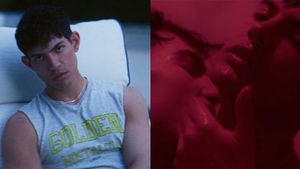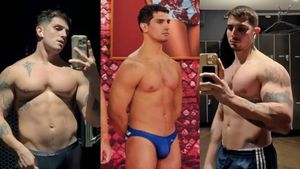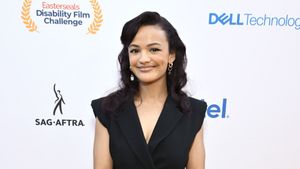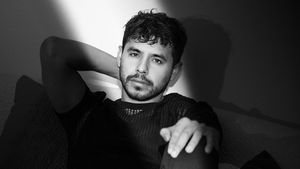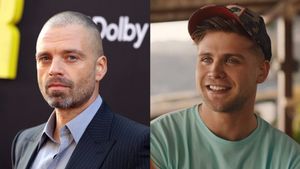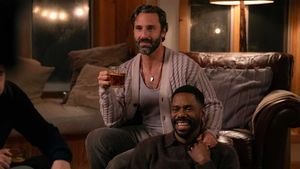Focus Feature's latest drama Never Rarely Sometimes Always tells the story of Autumn Callahan (Sidney Flanigan), an average 17-year-old high school student who, after finding out she has become pregnant, is seeking an abortion. Since safe and legal abortion access without parental consent is restricted from minors in her home state of Pennsylvania, Autumn finds herself making the journey to Planned Parenthood in New York City, and although it's difficult (money is tight and there are a bunch of strange, creepy men along the way) she has her best friend/cousin Skylar (Talia Ryder) by her side to be there for her along the way.
PRIDE sat down with writer/director Eliza Hittman and the film's two leads, Sidney Flanigan and Talia Ryder, about realistic depictions of a teen's journey to get an abortion, the importance of female friendship and allyship, and more.
PRIDE: The film is so modern, relevant, especially when this current administration, with abortion rights and abortion access still being a widely-debated issue. There's still a threat of SCOTUS overturning Roe v. Wade and then other abortion laws being contested all over the country. Could you talk a little bit about the genesis of the project, like how you got started writing it and why it was important for you to create this film with this story and this message?
Eliza Hittman: Yeah, I started working on the movie in 2012 when Savita Halappanavar died. She was a dentist in Ireland who was denied a life-saving abortion. And I just began reading about the journey that women take when they can't get access. Specifically, looking at the journey from Ireland to London for an abortion. And just through reading about all the women who are forced to travel and what's insensitively known as "abortion tourism." I just started to wonder why I'd never seen a film about it. And for me, as a filmmaker, I was thinking about this compelling journey and how it felt like in cinema, a hero's journey but one that hadn't been told because it's something that obviously is highly private and taboo and stigmatized. I really started then and I just began to think about what that journey looks like in the United States.
Sidney and Talia, what's it like to be a part of this very important film with a very important message? And can you both talk about how and why you got involved with Never Rarely Sometimes Always.
Sidney Flanigan: Yeah. It felt like a really transformative and important experience when I was reached out to be in this film. At first, I was pretty hesitant cause I never acted before. But I talked with Eliza and read her script and was really drawn to the power of the story and how real and honest it seemed. And I just felt really compelled to be a part of it.
Talia Ryder: Yeah, I'd say the same for me. I was really attracted to a female-driven story about this untold journey that so many women in our country have to face and yeah, I really loved Eliza's script.
Did you feel any pressure or nervousness at all, especially since you guys are leading the film and the film's message is so important and wide-reaching?
Sidney: There were a lot of factors at play for me because for one, I was incredibly new to acting, and so it was navigating a totally new experience in general on top of the fact that it was such an important subject matter. So there was a bit of a feeling of responsibility and I wouldn't say pressure necessarily, but I just felt the need to do my best.
Allyship is extremely important, and a lot of movies or TV shows that deal with abortion show a woman having to either struggle with the decision alone or the people around her are being extremely dramatic and hounding her. One of the best aspects of the film is Skylar really being there for Autumn every step of the journey. Skylar even had to kiss a gross, creepy boy to help them financially. Talia, what was it like playing up that aspect of Skylar, and Eliza, why was it important to have their relationship as friends, cousins, and allies be shown on screen?
Eliza: I guess for me, I was writing a lot about who would go with her. I went back and forth between different iterations of the story, is it a mother-daughter story, does she go alone? Ultimately, what felt most truthful to me was making it a friend. Because I think that peers don't judge. And I think, because you know, she ultimately wanted to bring the person who could be there for her without judging and without prying. And I think that there are not enough movies out there that really explore female friendship. The ways in which women truly support each other. A lot of reviews have popped up over the last week on Christian websites and it's been interesting to read them because I think what's so disarming for them in watching the movie is that there is no moral dilemma or moral complexity. It's working them up and it was something that I made a clear choice about. (Autumn) doesn't go through a decision-making process, she knows already what she wants at the beginning of the movie. And I think that's really what's unique about the depiction of a young woman getting an abortion in this film.
Talia: Skylar's character is a girl who would go great lengths for the other women that she loves. I'm an older sister and I have a lot of really great female friendships in my life and I feel like I would take the same length in order to protect one I love too. So it was nice to see that depicted in the film.
One of the most intense moments in the entire film was obviously the "never, rarely, sometimes, always" scene, especially since autumn revealed that she was being sexually abused by someone. Sidney, can you talk about what it was like having to film that scene and how emotionally intense it was? And Eliza, can you talk about how you handled constructing that scene and what kind of care you put in when directing it because obviously it's really emotional to have to act that out.
Sidney: I'd say that was a scene that was like...yeah, it was really intense and the subject matter is really heavy and it was a difficult scene to shoot but I think it's something that, I don't think there are many women out there who haven't experienced something like that, even to a small degree. I think it's very real for a lot of people and an easy emotion to tap into when you feel like you're in a world that's always kind of claustrophobic with men around you like that.
Eliza: I spent a lot of time researching the movie and meeting with people at Planned Parenthood consulting with them and I also met people at private clinics just for other points of view. And in that process of meeting people and talking to social workers, I met a social worker named Kelly Chapman and I spent a lot of time talking to her about her counseling sessions and asking her questions about dealing with minors and women who travel. And her voice really kind of filtered into the script as I was writing it because she kept answering all my questions and took me through the counseling session. So when it came time to cast that role, I couldn't imagine doing it with anyone other than her. So I think Sidney is an incredible actor who knows how to make herself very vulnerable and she was in really good hands that held real space for her to go to an emotional place.
The film premiered earlier this month, on-demand. Have you heard from any fans or viewers since then about what kind of impact this film has had on them? Especially since it's so realistic and it's a very much needed portrayal of the need for more abortion options for women all over the country?
Eliza: Yeah, I think there's a real outpouring of support for the film, critically and also from a general audience. At the moment, we're just sort of seeing comments and reactions and getting DM's but it seems like the movie is really speaking to people and really speaking to people who are sheltered in place. Simultaneously we're also trying to work with Planned Parenthood, film societies to help the film reach audiences and young women in places like Texas, Pennsylvania, and Ohio, et cetera.
Never Rarely Sometimes Always is currently available digitally on-demand. Watch the official trailer in the video below.
If you or someone you know needs access to safe, preventive healthcare and family planning, a list of resources is available on the official Her Journey. Her Choice. website.











































































